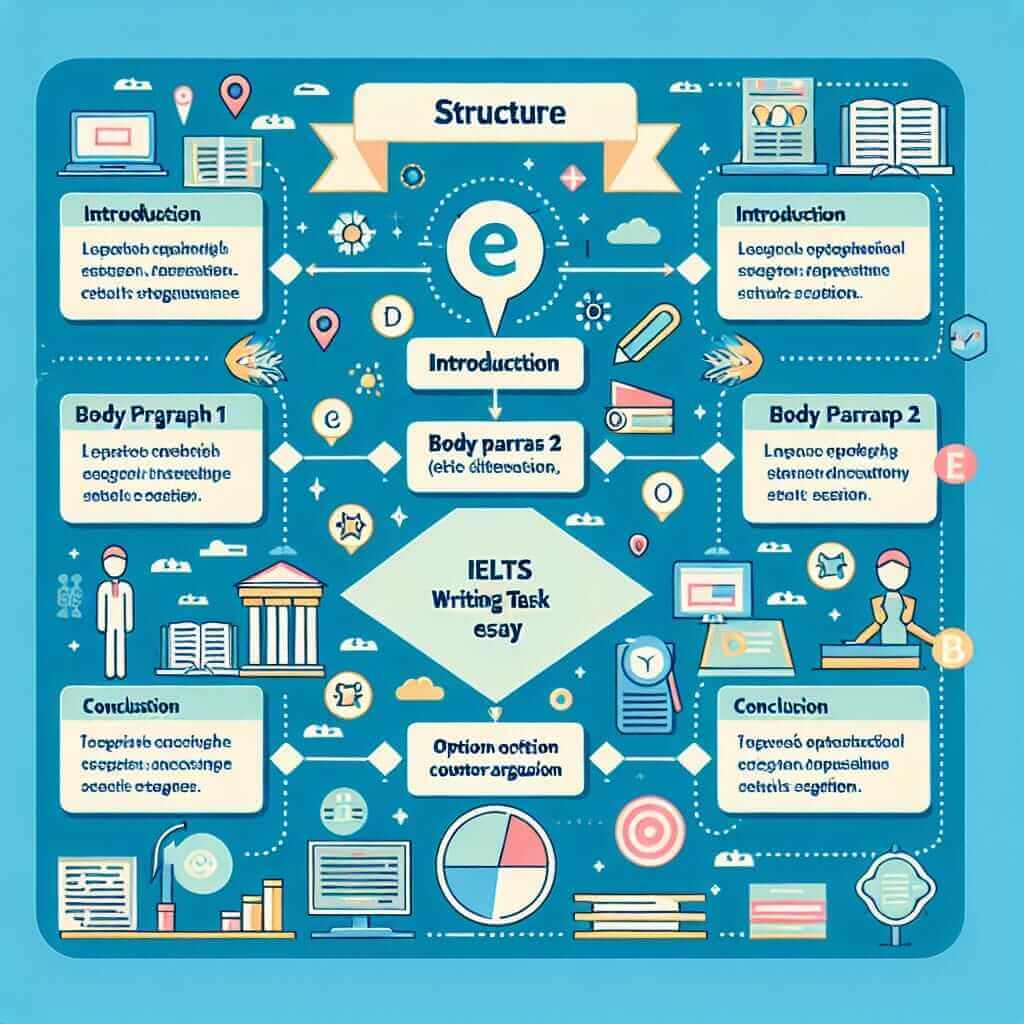As an IELTS instructor with over 20 years of experience, I understand the importance of a high Writing score for your IELTS success. Many students find Task 2 particularly daunting. Therefore, understanding its structure is crucial for achieving your desired band score.
This comprehensive guide will break down the essential elements of IELTS Writing Task 2, providing you with a clear roadmap to crafting a high-scoring essay.
Understanding IELTS Writing Task 2
In Task 2 of the IELTS Writing test, you’re presented with an essay question and asked to write a well-organized, coherent response in at least 250 words. This task assesses your ability to:
- Present and support your arguments logically.
- Use a wide range of vocabulary accurately.
- Demonstrate grammatical range and accuracy.
- Structure your writing effectively with clear paragraphs.
Essential Parts of an IELTS Writing Task 2 Essay
A successful IELTS Writing Task 2 essay typically comprises four key sections:
1. Introduction
The introduction should achieve two main objectives:
- Paraphrase the question: Briefly restate the essay question in your own words to demonstrate understanding.
- State your position: Clearly outline your stance or opinion on the issue presented in the question.
Example:
Question: Some people believe that the government should fund public transportation, while others think individuals should pay for their own transportation. Discuss both views and give your opinion.
Introduction: The question of whether governments should bear the financial responsibility for public transportation or if individuals should cover their own travel expenses is a subject of ongoing debate. This essay will delve into both sides of this argument before presenting my personal viewpoint.
2. Body Paragraphs (2-3 paragraphs)
This is the heart of your essay where you develop your arguments. Each body paragraph should focus on a single main idea with clear supporting evidence and examples.
- Topic sentence: Begin each paragraph with a sentence that introduces the main idea of that paragraph.
- Explanation: Provide a clear and concise explanation of your main idea.
- Supporting evidence: Use relevant examples, facts, statistics, or personal experiences to support your claims.
- Link to the next paragraph: Ensure a smooth transition to the subsequent paragraph.
Example Body Paragraph:
Proponents of government-funded public transport argue that it leads to a reduction in private vehicle usage, thereby alleviating traffic congestion and reducing carbon emissions. For example, cities like Amsterdam and Copenhagen, which have heavily invested in public transport, boast significantly lower levels of air pollution compared to cities with less developed systems.

3. Counter-Argument (Optional)
Including a counter-argument paragraph, where you acknowledge and address opposing viewpoints, demonstrates critical thinking and strengthens your overall argument.
- Introduce the opposing view: Begin by stating the counter-argument clearly.
- Refute the opposing view: Provide reasons and evidence to challenge the validity of the counter-argument.
- Reinforce your stance: Reiterate your position and explain why it is stronger despite the opposing view.
Example Counter-Argument Paragraph:
Conversely, some argue that individuals should be responsible for their own transportation costs, claiming that it promotes personal responsibility and reduces the burden on taxpayers. However, this perspective overlooks the fact that affordable public transport can be a lifeline for low-income households, enabling them to access essential services and opportunities.
4. Conclusion
Your conclusion should effectively summarize your main points and restate your opinion. It should not introduce new arguments.
- Summarize main points: Briefly recap the key arguments presented in your body paragraphs.
- Restate your opinion: Reiterate your stance on the issue in a clear and concise manner.
- Final thought: You can end with a thought-provoking statement or a suggestion for the future.
Example Conclusion:
In conclusion, while both sides of the debate have valid points, I firmly believe that government investment in public transport is essential for creating more sustainable, equitable, and accessible cities. By making public transport more affordable and efficient, we can encourage a shift away from private vehicles, leading to a greener and more livable urban environment for all.
Tips for a High-Scoring IELTS Writing Task 2 Essay
- Plan before you write: Spend a few minutes brainstorming ideas and creating a basic outline to ensure a coherent and well-structured essay.
- Use a variety of vocabulary and grammatical structures: This demonstrates your language proficiency to the examiner.
- Proofread carefully: Allocate time at the end to review your essay for any grammatical errors, spelling mistakes, or inconsistencies in your arguments.
- Practice regularly: Familiarize yourself with different essay question types and practice writing within the time limit.
By following these guidelines and practicing regularly, you’ll be well-equipped to tackle IELTS Writing Task 2 with confidence and achieve your target score.